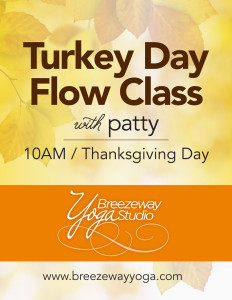 While classes are cancelled for Thanksgiving day, patty will lead her annual pre-feast flow. 10AM.
While classes are cancelled for Thanksgiving day, patty will lead her annual pre-feast flow. 10AM.
_________________
And, on Black Friday, Gina Baker is offering a Morning Mindful Flow class for only $8!
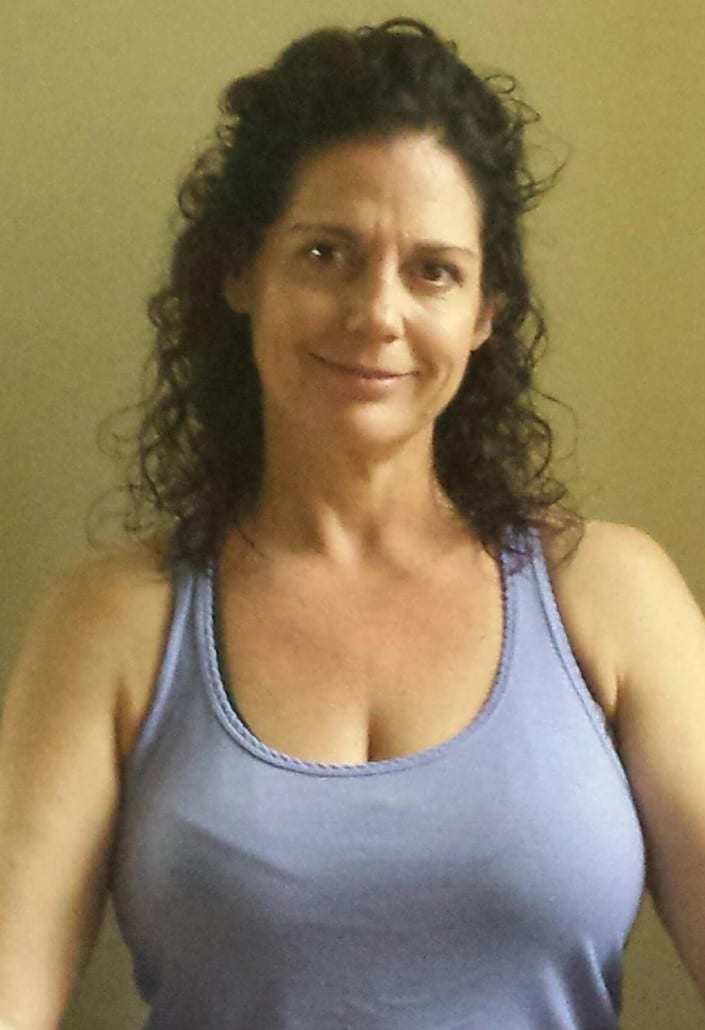
Beginner Flow with Cristina McClure, RYT | Monday, 5:30PM
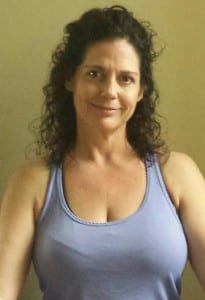 Cristina has been on the path of practicing yoga since 2003. She has been called to help others in discovering the many health benefits as well as the peace of mind that yoga inspires. The Yoga Asanas are the tools that she uses on her journey of self-discovery and she is honored to have the chance to share this journey with others. Cristina desires to offer guidance and support along the Path to anyone that earnestly seeks a healthy, more holistic life. The practice of yoga is more than just exercise, it is strongly encouraged that all serious yoga practitioners explore all eight limbs of yoga and discover for themselves the peaceful nature of reality.
Cristina has been on the path of practicing yoga since 2003. She has been called to help others in discovering the many health benefits as well as the peace of mind that yoga inspires. The Yoga Asanas are the tools that she uses on her journey of self-discovery and she is honored to have the chance to share this journey with others. Cristina desires to offer guidance and support along the Path to anyone that earnestly seeks a healthy, more holistic life. The practice of yoga is more than just exercise, it is strongly encouraged that all serious yoga practitioners explore all eight limbs of yoga and discover for themselves the peaceful nature of reality.
The Asanas are where we start to cultivate strength in the body and calm the mind. Sharing her knowledge with others is Cristina’s good fortune. “I enjoy helping people, it starts with taking care of our bodies, when our bodies are clean and healthy we are able to think with more clarity and begin to live life from a more divine and spiritual place. I believe that I am a servant of the community and I attempt to make the world a better place, one person, and one breathe at a time.”
Cristina is also a licensed hairstylist and has a hair studio in the Rocky Hill area of West Knoxville named Yellow Sky Salon where she also offers expertise and sales of DoTerra essential oils.
Cristina teaches many forms of yoga including: Ashtanga, Vinyasa, Power, Restorative and Yin.
You can reach Cristina at winfordmcclure@yahoo.com
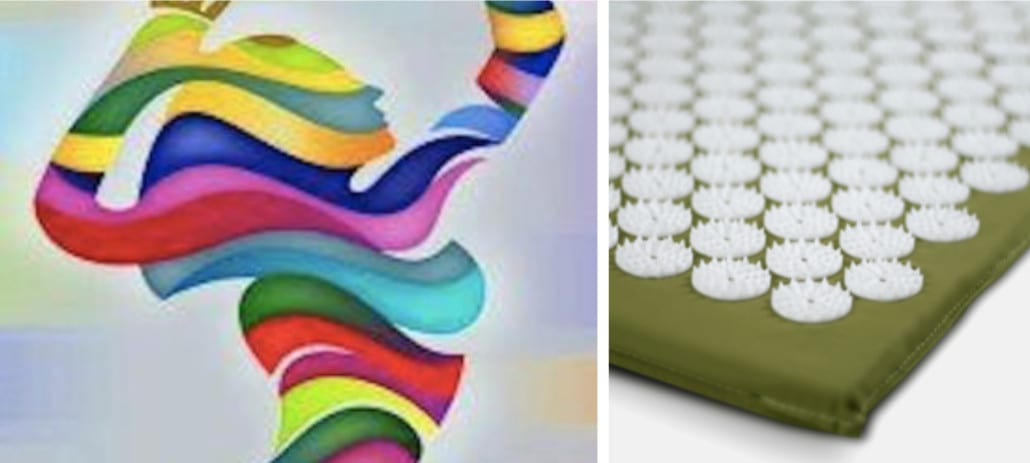
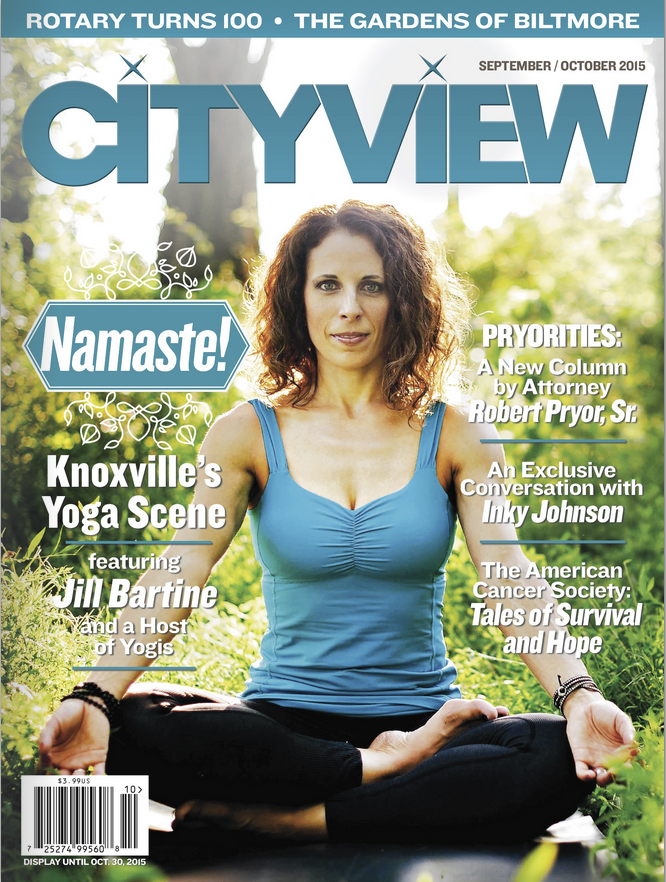
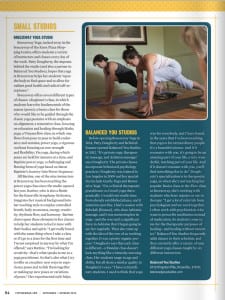 Breezeway Yoga and Balanced You Studios were recently reviewed in Knoxville’s Cityview magazine. We were thrilled to see instructor Jill Bartine on the cover as she is such an amazing spokeswoman for our studios and for yoga. The article offers a broad view of the Knoxville yoga scene and the various great yoga studios within our community. Click the page at left to read the article.
Breezeway Yoga and Balanced You Studios were recently reviewed in Knoxville’s Cityview magazine. We were thrilled to see instructor Jill Bartine on the cover as she is such an amazing spokeswoman for our studios and for yoga. The article offers a broad view of the Knoxville yoga scene and the various great yoga studios within our community. Click the page at left to read the article.
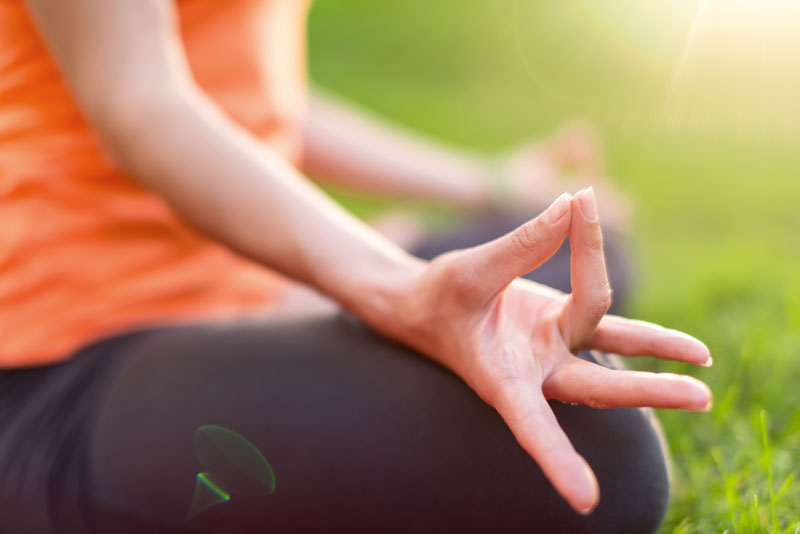
 Join Patty and other Breezeway Studio instructors as they lead classes at UTK’s Yoga Fest on Thursday, September 24th at Circle Park.
Join Patty and other Breezeway Studio instructors as they lead classes at UTK’s Yoga Fest on Thursday, September 24th at Circle Park.
The Center for Health Education and Wellness will be partnering with various campus and community constituents to host the second ever University of Tennessee Yoga Fest. Students, faculty, and staff are invited to join us for an afternoon of relaxing yoga practice and meditation at Circle Park on September 24th. There will be raffle prizes, professional instruction, and healthy snacks available to participants that partake in the event. Please direct questions to: wellness@utk.edu
Be one of the first 100 people to RSVP by showing your support for Yoga Fest 2015, and get a free t-shirt. Request your t-shirt here: tiny.utk.edu/yogafest
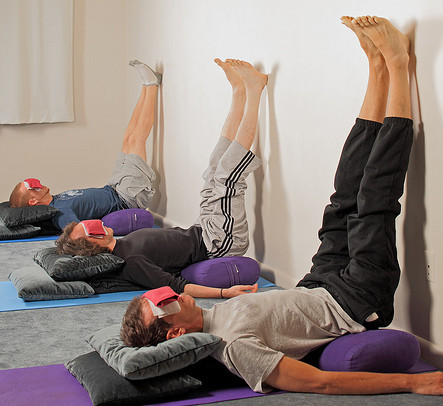
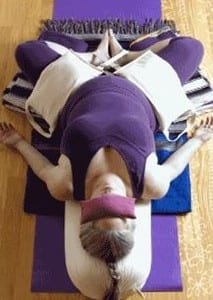 Friday, October 16th | 7:00 pm – 9:00 pm
Friday, October 16th | 7:00 pm – 9:00 pmRelax. Renew. Restore. The next Restorative Yoga Session with Patty Dougherty is scheduled for Friday, October 16th, 7:00 – 9:00 PM. Restorative yoga is a series of supported poses with gentle stretches and simple inversions.
Spaces go quickly for this class so connect with Patty soon to reserve a space – 951-6024 or email pattyyogamail@gmail.com.
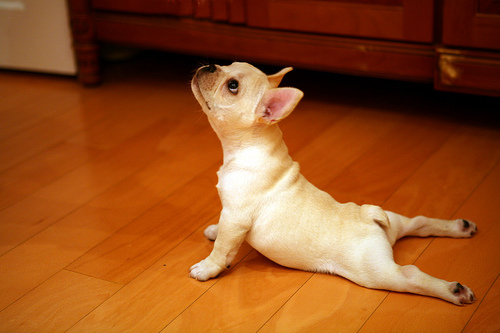
BY JASON CRANDELL | originally posted here in Yoga Journal
 If you’ve ever taken a flow class, you’ve no doubt heard the teacher call out “Chaturanga, Upward-Facing Dog, Downward-Facing Dog”—over and over again. Known as a vinyasa, this sequence is often inserted between poses, making them the most repeated poses in a flow-based class. When done correctly, they build suppleness, strength, and endurance. They also require the spine to extend, as you arch into Upward Dog, and then lengthen as you move into Downward Dog—ultimately bringing it into a neutral position. These poses cleanse the palate of the body so it’s ready for the next pose.
If you’ve ever taken a flow class, you’ve no doubt heard the teacher call out “Chaturanga, Upward-Facing Dog, Downward-Facing Dog”—over and over again. Known as a vinyasa, this sequence is often inserted between poses, making them the most repeated poses in a flow-based class. When done correctly, they build suppleness, strength, and endurance. They also require the spine to extend, as you arch into Upward Dog, and then lengthen as you move into Downward Dog—ultimately bringing it into a neutral position. These poses cleanse the palate of the body so it’s ready for the next pose.
Chaturanga and Upward Dog are difficult and demanding for any practitioner, and repeatedly slogging through them can feel like an uphill battle. Ever feel your neck tense and your shoulders hunch as you take a nose-dive into Chaturanga, ultimately collapsing into a heap on the floor? Or press into Upward Dog and feel a sudden twinge in your lower back, causing you to rush back to Downward Dog to find some ease? These common—and natural—mistakes can be avoided if you learn proper alignment and build strength to sustain it through the entire flow. In the long run, mindlessly racing through these poses can lead to injuries—typically to the delicate shoulder joints and the lower back.
Learning these poses in detail can be challenging, particularly in a flow class where the rhythm often takes precedence over the subtle nuances of the postures. So as you watch your fellow students move through Chaturanga and into Upward Dog, you might feel pressured to fake the poses and keep up with the class, rather than stand out as the solitary neophyte. But I urge you to resist this temptation.
Instead, I beg you (as I do my own students) to learn them slowly and to modify them. Rather than fake their motions and bypass their difficult aspects, develop these postures with finesse and mindfulness. In fact, if you allow yourself to be new—and a little lost—rather than bluffing the motions, your learning curve will be steeper. As you learn this modified version of Chaturanga and spend time hovering just above the floor allowing your arms to quiver, you’ll build strength. And as you extend your stay in Upward Dog, you’ll create the opening in your chest and upper back necessary to master more complex backbends. Give yourself time to pause, rewind, and replay the poses and one day, without gritting your teeth or holding your breath, you too will lower with control into Chaturanga and float effortlessly into Upward Dog.
Come onto all fours with your palms directly underneath your shoulders and your knees several inches behind your hips. Rest your shins and the tops of your feet on your mat. Spread your fingers wide and press the base of each one into the floor in order to distribute the weight of your upper body.
Next, bring your awareness to your belly and pelvis. Tuck your tailbone slightly and gently firm your lower belly (just below your navel). These two actions are vital in both Chaturanga and Upward Dog because they elongate and support your lower back.
Now, slide your shoulders away from your ears and squeeze the bottom tips of your shoulder blades together. Feel how this awakens your upper back as it broadens your chest. Gaze forward as you relax your jaw, soften your brow, and even out the texture of your breath.
With your knees on the floor, move your chest forward and down as you slowly bend your elbows and squeeze your upper arms into the sides of your body. Moving your chest forward and down—as opposed to only down—will keep your elbows aligned over your wrists and maintain the natural supportive architecture of your shoulders and arms. As you descend, keep your hips in line with your shoulders and chest.
Continue to move your chest forward and down until your upper arms are parallel to the floor—but not any lower (your elbows should form about a 90-degree angle). Remain here for two full breaths, staying with the intensity of Chaturanga instead of rushing through it. Breathe evenly and soften your facial muscles while you navigate the difficulty of this moment. If it’s too hard, back off and maintain your body’s integrity rather than overworking the pose, which leads to collapse or strain. If you’re unable to keep your upper arms parallel to the floor, back out of the pose by lifting higher up instead of crashing to the floor.
After a couple of breaths in modified Chaturanga, lower all the way to the floor. Then press back into Balasana (Child’s Pose) for a moment of rest.
When practicing backbends it’s not the depth of your backbend that matters. It’s more important to distribute the curve evenly along the full length of the spine. This is difficult to do in Upward Dog because you’re supporting the weight of your entire torso with your arms and legs. But don’t be discouraged—Upward Dog strengthens your shoulders, arms, and abdomen, even if it’s not your deepest backbend.
Before tackling Upward Dog, consider this anatomical information. Your pelvic bone is one of the heaviest bones in your body—and it’s more or less your center of gravity. This means that without proper support, it tends to sink toward the floor. While it’s common to work hard in your upper body in order to stay lifted, the key to supporting your weight in Upward Dog is to use your belly and legs to hold the pelvis stable. This makes the posture easier and more sustainable.
From Child’s Pose, come back onto your hands and knees. Move through modified Chaturanga, hovering two inches above the floor. Then transition into Upward Dog by straightening your arms and stacking your shoulders directly over your wrists. Your shoulders may end up in front of your wrists, which leads to strain. So look down at your hands to gauge where your shoulders are and adjust accordingly by moving yourself forward or back.
Now that your arms and shoulders are properly aligned, you can focus on your legs. To counteract lower back compression in Upward Dog, keep the sacrum broad and long. To keep it broad, rotate your legs internally by spinning the outsides of your thighs toward the floor and pressing the pinky toes into the mat. To keep it long, draw your tailbone toward your heels—as you did in Chaturanga—and draw your lower belly up into your body. After these refinements, straighten your legs vigorously, lifting your shins and knees off the floor. As you do this, don’t squeeze your buttocks. It may be difficult to keep the buttocks soft and the legs firm, but squeezing the buttocks will jam the lower back.
At this point, the only things touching the floor are the tops of your feet and the palms of your hands. To complete Upward Dog, make a few last adjustments in your upper body: First, observe how your weight is distributed on your hands and wrists. Is it concentrated on your wrists? Localized on one side of your palm? Or is it dispersed evenly? Make subtle shifts in your hands and arms until the weight is evenly distributed and no part of your wrists are being stressed. (You can check this by looking at your mat—if you see an even handprint, you know you’ve got it.)
Stay in the pose as you lift, broaden, and draw your chest forward. Lift your collarbones as if they were going to loop over the top of your shoulders, and slide your shoulder blades down your back. As you did in Chaturanga, draw the lower tips of your shoulder blades toward each other and firm them into the back of your chest. Bring your shoulders down and back and observe how this helps lift your chest even more. Lastly, with your head placed directly over your shoulders, gaze forward and up. Avoid dropping the back of your skull toward your shoulders. Instead, maintain an easy, natural curvature of your neck as you look up.
After three to six breaths in Upward-Facing Dog, bring your knees to the floor and transition into Child’s Pose.
Now that you’ve practiced Chaturanga and Upward-Facing Dog separately, you can link them together and incorporate your breath into a flowing sequence.
Begin on all fours with your wrists directly under your shoulders and your knees about a foot behind your hips. Draw a full, smooth inhalation into your body. As you exhale, bend your elbows and lower your chest downward (and forward) until your upper arms are parallel to the floor. Inhale and straighten your elbows until your shoulders are directly over your wrists. Continue inhaling, filling your lungs to the brim, and lift the top of your thighs and knees away from the floor. Exhale and shift back onto all fours, or, as you do in Sun Salutations, come into Downward-Facing Dog.
Practice these poses consistently and they’ll feel less clunky and more silken. When this happens and the postures feel natural and graceful, congratulate yourself (humbly) and begin to lift and straighten your legs as you practice Chaturanga. Most important, enjoy the feeling of flow in your body at every stage.